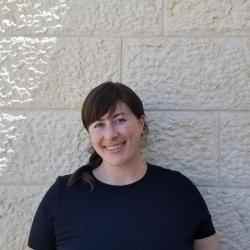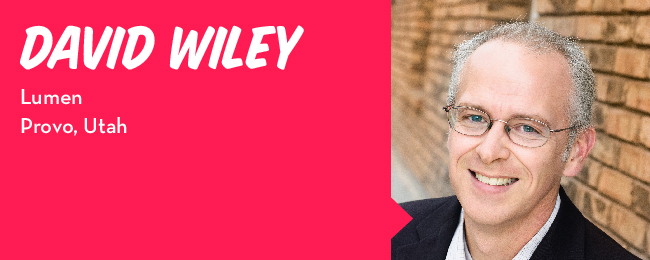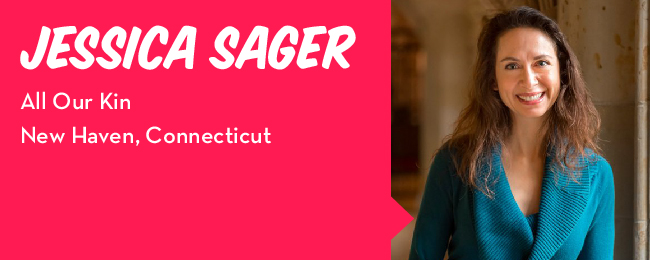
Rachel Fauber
Rachel Fauber leads global marketing, communications and framework change at Ashoka, and previously served as the Director of Communications for the Ashoka Changemakers team. At Ashoka, we believe that by telling powerful stories and uplifting new narratives we can shift societal frameworks, transform mindsets, and inspire action for the common good.
Rachel holds a Master’s degree in Social Enterprise from American University, a graduate certificate from Georgetown University in Social Impact Storytelling, and a Bachelor’s degree in Mass Communication from Towson University. Her graduate research focused on youth-led social change and participatory measurement and evaluation. Prior to joining Ashoka, Rachel worked in communications and social media marketing at the National Institute on Retirement Security and Himmelrich Public Relations, and served on the board of directors of the Young Nonprofit Professionals Network of Washington, DC.
Fourteen People Inspiring a Brighter Future

Bozeman, Montana. Provo, Utah. Navajo Nation. Baltimore, Maryland. Right now, across America, social innovators are taking on our biggest challenges with visionary thinking. Where others see problems, they see the spark of a new idea. They dare to try a different way forward. And they don’t give up until they translate “what if” into “what works.” We call them changemakers, and they’re everywhere, if you know where to look.
Ashoka does.
This week we’re thrilled to formally announce our newest class of Ashoka Fellows in 2017. These 14 systems-changing entrepreneurs are reimagining talent, economic identities, academic research, childcare, elder care, isolation, food systems, and ecological justice as they help us all identify lasting solutions to the problems affecting our lives.

Anne Basting is transforming the experience of aging, dementia and memory loss by transforming institutions of care into cultural and community centers of creative expression and growth. For more on her new idea, see Anne’s Ashoka profile and Forbes Q&A.

Candice Lys is cultivating a new generation of leaders in historically marginalized communities through a public health education and expression through the arts, evidence-based holistic practices, and intergenerational learning spaces. For more on her new idea, see Candice’s Ashoka profile.

Daniel Kish is transforming the training and experience of perceptual navigation for blind people that is more respectful of blind dignity and purpose, easier to teach, learn, and use; and is more diversely applicable to all people. For more on his new idea, see Daniel’s Ashoka profile and Forbes Q&A.

David Wiley is championing the concept of ‘open educational resources’ to reinvent how educational content is created, licensed, used, and improved—ultimately enabling college and university students to access to access radically improved class materials at dramatically reduced prices. For more on his new idea, see David’s Ashoka profile and Forbes Q&A.

By shifting the focus from ‘unhealthy people’ to systemic challenges, Denisa Livingston is empowering Navajo communities to take control of food policy and lead a movement toward food sovereignty in Navajo Nation. For more on her new idea, see Denisa’s Ashoka profile and Forbes Q&A.

Through a new citywide model for developing and retaining talent, Fagan Harris is helping cities upgrade the social sector’s capabilities, consciousness and collaborative capacity — empowering communities to solve their most pressing challenges. For more on his new idea, see Fagan’s Ashoka profile.

Gina Clayton is building a loving community for the millions of women with incarcerated loved ones, and harnessing their collective power to end mass incarceration’s harm to families and communities. For more on her new idea, see Gina’s Ashoka profile and Forbes Q&A.

Gregg Treinish is activating people who recreate in the outdoors — hikers, surfers, kayakers, mountain bikers and more — and applying it to rigorous data collection for the purpose of environmental stewardship and conservation. For more on his new idea, see Gregg’s Ashoka profile and Forbes Q&A.

Through BanQu, a disruptive innovation in the digital identity and financial inclusion spaces, Hamse Warfa is creating a paradigm shift in the way individuals and organizations (large and small) engage with refugees. For more on his new idea, see Hamse’s Ashoka profile and Forbes Q&A.

Jessica Sager is transforming and professionalizing the field of family childcare by supporting the providers in radically reimagining how they see themselves. For more on her new idea, see Jessica’s Ashoka profile and Forbes Q&A.

Laura Emiko Soltis is building a modern-day freedom school, using the lessons of the civil rights movement to implement a multi-faceted strategy to help undocumented youth gain both a university education and the tools to lead a movement. For more on her new idea, see Emiko’s Ashoka profile and Forbes Q&A.

Michelle Mascarenhas-Swan is helping build a vibrant and proactive movement for ecological justice in the U.S. by equipping frontline communities with a unifying framework and a national network of support. For more on her new idea, see Michelle’s Ashoka profile.

Rebecca Van Bergen is transforming the lives of millions of home-based workers in the apparel and home design industries by bringing their profession into the formal economy. For more on her new idea, see Rebecca’s Ashoka profile and Forbes Q&A.

Sharon Danks inspires and enables communities to enrich their school grounds and use them to improve children’s well-being, learning and play while contributing to the ecological health and resilience of their cities. For more on her new idea, see Sharon’s Ashoka profile and Forbes Q&A.
Ashoka searches the world for leading social entrepreneurs through an intensive, human-centered process, selecting them into our Ashoka global, trust-based fellowship of peers. Learn more about the process here.